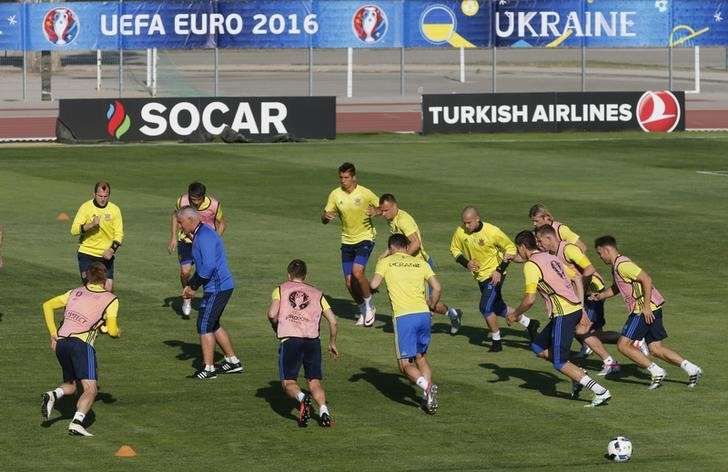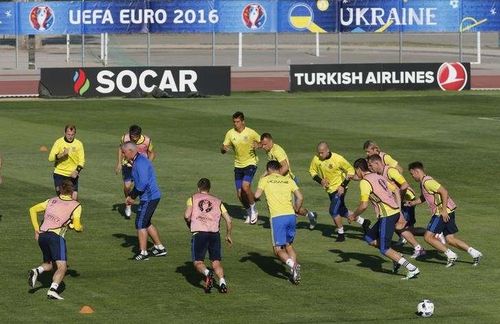
PREVIEW - Spotlight back on the pitch for expanded Euros

By Martyn Herman
LONDON (Reuters) - Bigger than ever, the European Championship kicks off in Paris on Friday with a four-week feast of football that promises to elevate the game above the corruption scandals and security fears that have overshadowed its build-up.
All eyes will be on hosts France when they get the ball rolling against Romania in the Stade de France -- 210 days after suicide bombers at the same venue triggered a night of horror across the capital which killed 130 people.
It should have been a proud moment for former UEFA president Michel Platini.
The France great, who inspired his country's 1984 title on home soil, achieved his wish of expanding the tournament to a record 24 nations.
But a four-year ban, handed down after becoming engulfed by the FIFA corruption scandal that has rocked the sport, means his presence at the tournament will be in a purely unofficial capacity.
Against such a backdrop it can only be hoped that the tournament, the first since the sleaze hit the fan last summer and the last with a single host before it goes continent-wide in 2020, can deliver some memorable moments on the pitch.
It certainly has the potential to do so with 51 matches in 31 days spread across France from the coal-mining country of Lens in the north to the Mediterranean port of Marseille.
Unfamiliar qualifiers will be hoping to show they belong and vindicate Platini's brainchild, criticised by some as substituting quality for quantity.
The establishment should prove again, however, that the cream inevitably rises to the top and that Greece's surprise triumph in 2004 was an anomaly.
Spain retained the title four years ago in Poland and Ukraine, a tournament comprising only 16 nations, and will be among the favourites to make it a hat-trick, although three-times champions Germany, 2012 runners-up Italy, France and a resurgent England will all fancy their chances.
Northern Ireland, Albania, Iceland, Slovakia and Wales are all appearing for the first time in the tournament which is second only to the World Cup in terms of prestige and not too far behind in quality.
For Spain's old guard, players such as Andres Iniesta, Sergio Busquets, Gerard Pique and Sergio Ramos, Euro 2016 could be their last hurrah after the disappointment of the Brazil World Cup two years ago, and with old sage Vicente del Bosque at the helm, they will take some stopping.
France, winners in 1984 and 2000, will carry the hopes of a nation still coming to terms with last year's militant attacks.
Manager Didier Deschamps has some enviable quality at his disposal in Juventus midfielder Paul Pogba and forwards Kingsley Coman and Antoine Griezmann.
World champions Germany will be targeting a first Euro title in 20 years while England seek their first international success since the World Cup of 1966.
Roy Hodgson's youthful side went through qualifying with a 100 percent record and have real goal threat in the form of Jamie Vardy, one of the stars for unlikely champions Leicester City, and Tottenham Hotspur's Harry Kane.
One consequence of the fatter format means only eight teams will be eliminated from the six initial groups of four, with even third place likely to seal a last-16 spot.
Spain's group looks the toughest on paper, with the Czech Republic, Turkey and Croatia, while France should comfortably top a section including Albania, Romania and Switzerland.
Italy will also have to be on their guard against a dangerous-looking Belgium squad, Ireland and Sweden who in Zlatan Ibrahimovic have one of the tournament's A-listers.
Others vying for the limelight include Portugal's Cristiano Ronaldo who endured a disappointing World Cup and is running out of time to claim a first title for his country
Of the debutants, Iceland's appearance will add novelty value although having finished above the Netherlands in qualifying they will need to be taken seriously by group rivals Portugal, Austria and Hungary.
Wales, too, will not just be making up the numbers if talisman Gareth Bale, who has led them to their first finals since the 1958 World Cup, is fit and firing.
(Editing by Neil Robinson/Toby Davis)